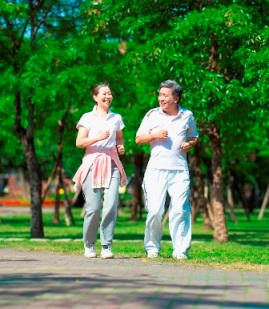SUN TEN Quarterly Newsletter Winter 2011: Wind Cold Pathogens and the Aggravation of Rheumatoid Arthritis Symptoms
Wind Cold Pathogens and the Aggravation of
Rheumatoid Arthritis Symptoms
By Modern Drug Weekly of
Wind cold pathogens invade the body easily during cold weather. Because of this, Dr. Tsai- Feng Li of the Chinese Medicine Department of Taipei United Municipal Hospital, reminds her patients suffering with rheumatoid arthritis (RA) to keep warm during cold weather in order to avoid an aggravation of their symptoms caused by wind cold pathogenic invasion. Another possible aggravating factor for RA sufferers is emotional turmoil which disturbs the Liver Qi. Chronic feelings of dejection may lead to stagnation of Qi and further result in blood stasis aggravating symptoms of joint pain. Consequently, it is very important for patients with rheumatoid arthritis to pay attention to their daily habits concerning work and rest. Reprieve from physical and emotional stress is crucial, and patients who can find time to relax will find that the intensity of their symptoms may diminish.

Dr. Li points out that rheumatoid arthritis is an autoimmune disease. However, at the same time, traditional Chinese medicine maintains that the Liver and Kidneys govern the tendons and bones, and patients with rheumatoid arthritis are often observed to show signs of Liver and Kidney depletion. In the event of a wind cold pathogenic invasion there may be further degeneration complicating the existing Liver and Kidney problems.
Patients with hot constitutions are more likely to manifest heat related symptoms such as redness, swelling, inflammation, and pain. Such patients may also have a dry mouth, profuse sweating, and other conditions related to dry-heat. Commonly used formulas include Anemarrhena, Phellodendron & Rehmannia Formula (Zhi Bo Di Huang Wan) and Clematis & Stephania Combination (Shu Jing Huo Xue Tang). Patients with cold constitutions will show signs of stiffness in the joints of the hands and feet. Because the control mechanism of the bladder has been affected, such patients may also have symptoms of frequent urination, including frequent urination during the night. Common symptoms in elderly patients include soreness and pain in the back and lumbus, as well as, joints that feel achy, painful and weak. The treatment should be focused on clearing heat and eliminating dampness. Commonly used formulas are Qiang Huo & Curcuma Combination (Juan Bi Tang) and Du Huo & Viscum Combination (Du Huo Ji Sheng Tang).
Chronic RA patients often have signs of damp-heat. Treatment for these patients should include clearing heat and nourishing Yin. If the patient has Liver and Kidney depletion, then treatment should focus primarily on enriching the Liver and Kidney. Dr. Li most often uses Dang Gui & Anemarrhena Combination (Dang Gui Nian Tong Tang) to help expel dampness and heat. For patients with Liver and Kidney Yin deficiency and signs of Yin fire, Dr. Li uses Anemarrhena, Phellodendron & Rehmannia Formula (Zhi Bo Di Huang Wan) plus additional herbal medicinals for the tendons and bones (herbs for supplementing the Liver and Kidneys), such as Eucommia (Du Zhong), Achyranthes (Huai Niu Xi), Taxilli (Sang Ji Sheng), Cuscuta (Tu Si Zi), Dipsacus (Xu Duan), or Cinnamon & Anemarrhena Combination (Gui Zhi Shao Yao Zhi Mu Tang).
Substances contraindicated for rheumatoid arthritis: Dr. Li believes that many people have developed autoimmune conditions because modern life is rather hectic and stressful. Patients should adjust their schedules to get enough rest and avoid too much stress. If patients have signs of redness, swelling, and heat they should not take Red Ginseng (Hong Shen) or Astragalus (Huang Qi) in order to avoid aggravating signs of inflammation.
Recommended Formulas for Rheumatoid Arthritis
